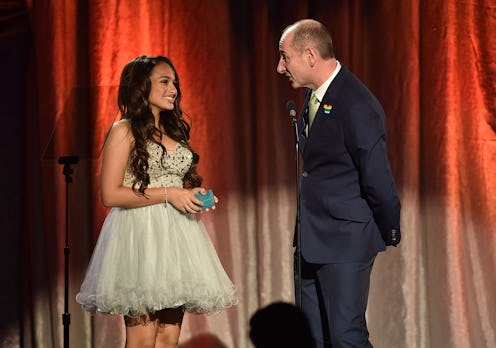News
Talking Can Reduce Anti-Transgender Prejudices
How do you reverse prejudice? It's a question activists and politicians have been asking for decades, perhaps now more so than ever as the increasingly ugly and personal political disagreements of this election cycle revolve heavily around issues of discrimination. The answer, it turns out, may be as simple as one in-depth conversation. Researchers found a single conversation substantially reduced voters' anti-transgender prejudices for at least three months.
Changing someone's mind isn't easy. The civil rights movement and every argument you've ever found yourself ending with the phrase "agree to disagree" are proof of that. Yet, as the findings of a recent study orchestrated by David Fleischer, director of the Leadership LAB at the Los Angeles LGBT Center and published Thursday in Science show, maybe people have simply been going about it in all the wrong ways.
Fleisher felt he had tapped into an effective method of changing voters' opinions in 2008 after he began canvassing door-to-door, engaging voters in deep conversations aimed at personalizing the issue of same-sex marriage following the passage of California's Prop. 8, a voter-approved gay marriage ban that was later overturned by the Supreme Court. Led by Stanford University assistant professor David Broockman, researchers examined the efforts of 56 trained canvassers — some transgender, some not — who engaged 501 conservative voters in Miami, Florida, in conversations about transgender rights.
The conversations, which would last anywhere from 10 to 12 minutes, were not argumentative, but instead focused on discussing instances when the voter and the canvasser felt discriminated or attacked to facilitate active perspective-taking. It became known as "deep canvassing," and it worked.
"When we were nonjudgmental and vulnerable with them and when we exchanged our lived experiences about marriage and gay people, that's when we started changing people's minds," Fleisher told NPR.
In contacting the same voters weeks or months after the initial conversation, researchers found decreases in transgender bias "greater than Americans’ average decrease in homophobia from 1998 to 2012." Voters maintained their "substantially reduced transphobia" for three months with increased support for a nondiscrimination law, the study claimed. In surveys given in the weeks or months prior to and after a volunteer canvasser spoke to them face-to-face, voters were asked to rate their feelings toward transgender people on a scale of 0 to 100, with 100 being most positive. On average, voters who'd engaged in personal conversations about prejudice with canvassers felt roughly 10 points more positively toward transgender people.
This wasn't the first time Fleisher had turned to the scientific community to test his theory that talking, in the right way, could work to reduce prejudice. He'd previously asked University of California, Los Angeles grad student Michael LaCour to analyze the results of his earlier efforts canvassing voters regarding Prop. 8 and same-sex marriage. LaCour's work, however, ended up doing more damage than good. Less than a year after LaCour's findings were published, Broockman and Joshua Kalla — the research duo behind the most recent study — found they had been almost completely fabricated.
Broockman told the Atlantic he thought "deep canvassing" had proven effective because it involved really listening to the voters and not just peppering them with facts and argument. "The thing is that people are very rarely listened to in a way that makes them really think through the decisions they make in their lives," Broockman said. "Yes, it’s a relatively brief interaction but it’s very different to what people experience in their day-to-day lives."
In engaging in personal conversations, canvassers successfully humanized transgender rights and helped conservative voters relate to an issue they had little exposure to, which in turn reduced long-ingrained prejudices. Seems we should all start talking a little more.
